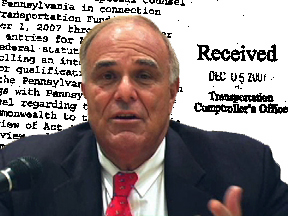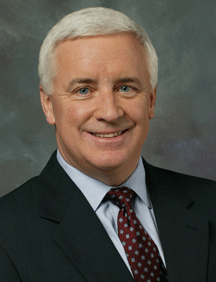
PA Gov. Ed Rendell awards his former law firm
PA turnpike privatization legal workBallard Spahr lawyers bill state up to $637 per hour
PA Treasurer's Office approves payments to treasurer's husband, Ken Jarin
by Bill Keisling
Posted March 10, 2008 -- Pennsylvania Gov. Ed Rendell has awarded his former law firm an extremely lucrative contract to act as special counsel in the proposed privatization of the Pennsylvania Turnpike, and related matters, including the proposed change of Interstate 80 into a toll road.
PDF Download:Ballard Spahr billing invoices for turnpike privitization legal work
387 pages in PDF format (12.3 MG) Right click on link or photo above to download pdf to your hard drive
Watch YouTube video:
To watch WHTM TV report of this story click here >
The law firm, Ballard, Spahr, Andrews and Ingersoll, of Philadelphia, has billed the Commonwealth of Pennsylvania approximately $1.8 million for turnpike privatization and related legal work from March 1, 2007 to January 8, 2008, state records show. An additional invoice was submitted in February, bringing the actual total costs to date closer to $2 million.
The special counsel arrangement with Ballard Spahr is administered by the Office of General Counsel of the Pennsylvania Department of Transportation (PennDot), and paid out of PennDot's operating budget.
Lawyers at Ballard Spahr have charged the state at an hourly rate of up to $637.50 an hour for the legal work. Some of these charges were incurred even before a contract was in place. Gov. Rendell's turnpike privatization proposal meanwhile has stalled politically.
The Pennsylvania Turnpike Commission ironically fell out of public favor in the 1980s and 90s in no small part due to its practices of insider, no-bid legal and bond work, known as "Pinstripe Patronage."
Rendell officially joined Ballard Spahr in early 2000, immediately following his eight-year term as mayor of Philadelphia. Rendell was paid $250,000 a year by the firm. Rendell has said he did "very little" work for the firm. At the time, Rendell was also general chairman of the Democratic National Committee, and taught at the University of Pennsylvania.
When former Mayor Rendell joined the firm a press release announced, "Ed Rendell may be the most significant lateral addition we have ever made to our partnership," said Arthur Makadon, Chairman of Ballard Spahr's Litigation Department and a long-time friend of Rendell's. "The partners are incredibly enthusiastic about having someone of Ed's national stature and reputation join the firm," Makadon added.
No-bid, no-contract contract:
The 'relationship partner' and the state treasurerWe've all heard of no-bid contracts. Ever hear of a no-contract contract?
No contract was in place when Ballard Spahr attorneys began their role as special counsel to the Commonwealth in March 2007. A Commonwealth of Pennsylvania Department of Transportation "Compromise, Settlement and Release" agreement dated September 27, 2007, documents that Ballard Spahr "was directed by the Office of General Counsel to provide professional services as special counsel to the Commonwealth of Pennsylvania in connection with the Pennsylvania Transportation Funding initiative" on March 1, 2007.
The document continues, "due to the extreme urgency of the work required, work began immediately at the Office of General Counsel's direction prior to having a fully executed contract document in place." And that work interestingly enough went on for the better part of three months before the lawyers figured out how to write a contract.
The "Compromise, Settlement, and Release" agreement in September 2007 was made necessary to pay Ballard Spahr $773,711.77 in legal fees because, the document states, " the Commonwealth cannot otherwise pay (Ballard Spahr) for services performed during the period of March 1, 2007 and May 23, 2007 because no agreement was in place prior to performances of such services." In other words, the "settlement" agreement was made retroactive to cover the earlier time period.
The "Commowealth and the Law Firm mutually desire to settle the Law Firm's claims for the amount due," the agreement reads. "By way of settlement, the Commonwealth offers to reimburse the Law Firm the amount due under the invoice, totaling $773,771.77, and the Law Firm accepts reimbursement in this amount as full settlement of its claim." This "settlement" merely was an instrument allowing Ballard Spahr's back invoices to be paid, and seems disingenuous. There obviously was never a dispute between the parties.
A contract between the Commonwealth and Ballard Spahr was finally executed and became effective on May 24, 2007.
When an "executed contract" finally arrived from Ballard Spahr, it was delivered by no less than a former Rendell administration and cabinet official.
A letter written on Ballard Spahr stationary dated April 27, 2007, from Ballard Spahr partner Adrian R. King, Jr., to Deputy General Counsel Andrew Clark, announces, "Enclosed find the executed Contract for legal services." This letter was cc'd to Ballard partners J. Brian Walsh and Arthur Makadon.
King at different times has worked for both Ballard Spahr and Gov. Rendell. In 2003 King left Ballard Spahr to become Gov. Rendell's special assistant and, later, deputy chief-of-staff; in 2005 he was appointed director of the Pennsylvania Emergency Management Agency, a cabinet-level position, before returning to Ballard Spahr.
King didn't return a request to comment for this article.
Dozens of Ballard Spahr attorneys would end up billing the state for work on the turnpike privatization project. Among the early beneficiaries of the then-uncontracted turnpike legal work include Rendell fundraiser Kenneth M. Jarin, also a partner at Ballard Spahr. Jarin was also the co-chair of Rendell's re-election finance committee. In 2005, Jarin drew press attention for accepting legal work from GTECH, a Rhode Island firm that won a $6.3 million state contract to build and maintain a central computer system for some 60,000 slot machines at Pennsylvania's new casinos.
Jarin billed the Commonwealth at a rate of $531.25 an hour for 46.5 hours of turnpike privatization-related work in April and May 2007. The firm's billing records show that Jarin billed $24,703.15 for the 46 hours of then-uncontracted work.
In the Ballard Spahr billing documents filed with the state, "KM Jarin" is also listed on each page as a "Relationship Partner" with the client, the Rendell Administration.
Making the arrangement all the more unusual, the uncontracted legal work "settlement" was approved and paid in October 2007 by the office of Pennsylvania State Treasurer Robin L. Wiessmann, who is Jarin's wife. Ms. Wiessmann was appointed state treasurer by Gov. Rendell in April 2007, following the election of former treasurer Robert P. Casey, Jr. to the U.S. Senate.
Rendell fundraiser Jarin has personally given large political donations to Gov. Rendell. From 2000 to 2006, state records show, Jarin donated $90,000 to Rendell's election committee.
When reached by phone and asked about the meaning of the phrase "Relationship Partner," Jarin said, "We have a client, and we represent the client. I really can't comment more than that."
Nice work if you can get it:
100 times the minimum wageOther beneficiaries of the Rendell/Ballard Spahr turnpike legal work arrangement include tax specialist Frederic L. Ballard, Jr., a partner in the firm. Billing records show that FL Ballard, Jr. billed the state at a rate of $637.50 an hour for 203.9 hours of legal work from March 2007 to January 2008. Records show that he billed the state $129,986.25 for the 203.9 hours of work.
Billing records indicate "A Makadon" billed the state for 16.3 hours of work at $637.50 an hour in 2007 -- a total of $10,391.26 for slightly more than the equivalent of two working days worth of legal travail.
By far the biggest beneficiary of the "turnpike privatization" special counsel work was Ballard Spahr attorney J. Brian Walsh, who billed the state $397,832.75, for 891.5 hours of work performed at a rate of $446.25 an hour.
Walsh, Makadon and Ballard each declined a request to comment for this article.
Documents show that the Ballard Spahr attorneys billed Pennsylvania at a 15 percent discount of their standard hourly rate. As of September 2007, Kenneth Jarin's standard hourly rate is listed as $625 an hour; J. Brian Walsh's standard hourly rate is $525; while Frederic L. Ballard, Jr. and Arthur Makadon's hourly rates are both listed as $750 an hour. One observer pointed out that some of these lawyers' compensation is based an hourly rate of more than 100 times the state minimum wage.
The current basic minimum wage in Pennsylvania is $7.15 an hour.
Ballard Spahr attorneys serve as co-counsel on the privatization work with a second firm, Mayer Brown, of Chicago. Mayer Brown invoiced the state $430,028 from April to November 2007, records show. Mayer Brown attorney John R. Schmidt billed the state at rates of $680 to $765 an hour; the latter is a 15 percent discount rate from an hourly rate of $900 an hour.
Even at his discount rate, the fees add up. One invoice, for example, marked "For professional services rendered for the period April 30, 2007 through May 21, 2007," charges the state $16,320 for 24 hours of Mr. Schmidt's time. Schmidt did not respond to an email request for a comment on his work.
Doubletalk:
'Appearance of undue influence'State records indicate that Democrat Gov. Rendell’s campaign committee received $40,000 in political contributions from the Ballard Spahr law firm from January to November 2007. From April to December 2007, Ballard Spahr also donated $10,000 to Republican state Attorney General Tom 'Let the Good Times Roll' Corbett. All this then is classic pinstripe patronage.
A March 18, 2007 Philadelphia Inquirer article rehashed endless complaints that state Sen. Vincent Fumo (D-Philadelphia) for years "marketed" Fumo's law firm, Dilsworth Paxson, "from City Hall to the state capitol," earning millions in legal fees from the public weal. Fumo currently is under federal indictment for corruption.
'"I think it creates at least an appearance of undue influence when a legislator is asking a governmental agency or authority to give work to a firm," Gov. Rendell told the Philadelphia Inquirer in March 2007. At the time, the Inquirer reported, 'Rendell said he didn't drum up government work for Ballard Spahr'
To the contrary, state records show, by March 1, 2007, Gov. Rendell was doing precisely what he said in the March 18, 2007 article he did not do. 'Fast Eddie' just had no contract in place.
"I think it creates at least an appearance of undue influence when a legislator is asking a governmental agency or authority to give work to a firm," Gov. Rendell told the Inquirer at the time.
The article continues, "Before he was elected, (Rendell) took criticism for his $250,000 salary from Philadelphia's law firm of Ballard, Spahr, Andrews & Ingersoll in return for what he said was 'very little' work. But Rendell said he didn't drum up government work for Ballard Spahr."
To the contrary, state records show, by March 1, 2007, Gov. Rendell was doing precisely what he said in the March 18, 2007 article he did not do. "Fast Eddie" just had no contract in place.
The myopic Inquirer also reported, inaccurately, "The practice of dishing out legal work, especially bond work, to politically wired firms is a time-honored part of the political spoils system in City Hall and the state capitol. 'Pinstripe patronage,' it's been called."
The practice is certainly not "time honored." The Roman Coliseum, the Pyramids of Giza, the Brooklyn Bridge, even the Pennsylvania turnpike, were not built by legions of overpaid lawyers, thank you very much. They were built by hard-working people, led by inspired leaders.
Pinstripe patronage in Pennsylvania state government, and the Pennsylvania turnpike, for the most part dates only from the mid-1980s, in the administration of Gov. Richard Thornburgh.
In September 1985 Thornburgh infamously approved what came to be called the "Noah's Ark Deal," in which "Two of everyone," a bond underwriter and bond counsel for each political party, were given lucrative contracts, in return for fat political contributions. Pennsylvania has no limit to the size of political donations. You don't need bribery when you have a legalized system like this.
Both parties get a piece of the action, so no one kicks. The two parties cooperate amazingly well to receive this insiders' largesse. Try to fund a school, a library, or a hospital, and that's where the interparty cooperation breaks down.
All this ultimately led to charges of legalized kickbacks, nepotism, blatant institutional dishonesty, cronyism, corruption, and widespread calls for reform at the Pennsylvania turnpike. In the 1990s you'd go to public hearings and witness turnpike flacks explain deadpan why, out of 13 million Pennsylvanians, the turnpike staff was loaded with family and friends of prominent state senators. They were the only, and the best, people available for the jobs, the big lie went. Just as today Pennsylvanians incessantly hear some politician explain why his or her law firm, or bond underwriter friend, or casino operator acquaintance, or computer supplier is the best and only vender available for the job.
The 1985 Noah's Ark Deal presaged the flood that now threatens to wash away the Pennsylvania turnpike. In no small part it's what brought us to where we are today.
The Rendell guys just don't get it, and don't seem to grasp where we are, or how we got here.
For decades, from its opening in 1940, the turnpike's patronage practices involved the ruling political party macing thousands of everyday, lunch-bucket workers. If you had a job at the turnpike, you were expected to kick back $50, twice a year, to the ruling party's patronage chief. This shakedown money openly went to the party coffers.
In the 1970s, 80s and 90s, the courts ruled these practices illegal. That's when, and why, the parties discovered Pinstripe Patronage.
In the old days, everyday workers at least received wide-spread benefits -- they were called jobs -- from the Pennsylvania turnpike.
These days, everyday workers get nothing from the lawyers, except the bill.
Little sucker:
Same old, same old, cloaked as reformIn 2006 Gov. Rendell announced his intention to explore "privatizing" the Pennsylvania turnpike. Rendell solicited "Expressions of Interest" from various parties to lease or buy the historic toll road. In December 2006 it was reported in the press that Ballard Spahr submitted a letter expressing interest in taking over the turnpike. It's not known whether the law firm, now acting as special counsel in all this, is still pursuing its reported interest in leasing or buying the 'pike.
Who's minding the store?
From April to December 2007, Ballard Spahr donated $10,000 to Republican state Attorney General Tom 'Let the Good Times Roll' Corbett.
Gov. Rendell’s campaign committee meanwhile received $40,000 in political contributions from the Ballard Spahr law firm from January to November 2007
The privatization plan, and its billions in private arbitrage, stalled. In July 2007, to inject funds into the highway department, the Pennsylvania legislature and Gov. Rendell hurriedly backed a memorable new Ponzi scheme proposed by the turnpike commission, Act 44. This legislation enabled the turnpike commission to increase tolls on the turnpike and to enter into a lease agreement to take control of Interstate 80 from PennDot. Interstate 80 runs across the state's northern tier.
In return, the threatened-with-extinction turnpike suddenly found itself committed to pay the cash-strapped state Department of Transportation hundreds of millions of dollars in lease payments and other tributes of the vanquished, all financed by a fresh and juicy new turnpike bond issue. Under this cash-starved Rube Goldberg scenario, the turnpike would pay on the highway department bonds by collecting tolls on Interstate 80, paying for it all, including the bond lawyer's abritaged lunch vouchers, over decades at interest by fleecing the yokels on a distant upstate roadway.
Unfortunately, collecting tolls on an interstate highway requires federal approval. It turns out, believe it or not, you just can't put up a barricade on I-80, hoist a pirate's flag, and loot motorists, like is done in West Philly.
The unpopular idea of tolling Interstate 80 spawned its own political backlash. On October 13, 2007, the PA Turnpike Commission and PennDot together filed an application and coloring book with the Federal Highway Administration to change Interstate 80 to a toll road. This application received a cool reception not only with the SUV-driving public, but with regulators in Washington, and with the state's Republican congressional delegation, particularly northern tier congressmen John Peterson, of Titusville, and Phil English, of Erie.
At one point Gov. Rendell appeared with indicted state Sen. Vince Fumo to insult congressmen Peterson and English for attempting to derail the I-80 tolling plan in Congress. Fumo said he worked with Peterson in the state legislature, "and we were never impressed with him. Phil English used to run the Xerox machine in the Senate staff, and I'm not sure about his depth." Congressman English missed a great comeback line: Fumo after all is under indictment for running the turnpike patronage machine.
When informed of Ballard Spahr's role in Gov. Rendell's turnpike plans -- the cost of the billings, the initial lack of a contract, the roles of Ken Jarin and his wife, our invisible state treasurer -- Congressman Peterson, a former grocer, repeatedly made a choking sound, and wondered aloud whether all this was, well, legal.
"Is that even legal?" he kept asking me, appalled.
I was reminded of the 1987 movie Broadcast News, in which the John Hurt character is accused of crossing some ethical line.
Hurt responds, "They keep moving the little sucker, don't they?"
Up the river and around the bend:
Can't get there from hereShould the I-80/turnpike tolling scheme fall apart, Gov. Rendell has threatened to renew his plan to privatize the turnpike. This confusing mish-mash of goals, and lack of any coherent plan, is reflected in the Ballard Spahr billing invoices of 2007. The only sure thing came to be the growing legal fees.
A $62,604.97 Ballard Spahr invoice, dated September 10, 2007, for example, reads:
"For professional services rendered as special counsel to the Commonwealth of Pennsylvania in connection with the Pennsylvania Transportation Funding Initiative from August 1, 2007 through August 31, 2007 including: review of federal statutes and regulations regarding tolling of an interstate highway; attendance at a meeting with Governor Rendell and others regarding procurement for possible concession of the Pennsylvania Turnpike to a private party; meetings with the Pennsylvania Turnpike Commission and its counsel regarding the lease of Interstate 80 by Commonwealth to the Pennsylvania Turnpike Commission; review of Act 44 and other relevant legislation; review and analysis of Pennsylvania Turnpike Commission documentation for its proposed bond anticipation note issue .... " and so on.
It might as well say, "Let's go to the moon, and if we can't do that, let's study the possibility of taking the trolley down to the market to buy a cheesesteak sandwich..."
Internal PennDot funding for the Ballard Spahr arrangement has been increased several times in recent months to keep pace with incoming invoices. On May 14, 2007, a mere $189,159.21 was budgeted. This was increased by another $1,060,840.79 on July 1, 2007. It was soon increased, yet again, another $499,999. To keep paying the invoices for the foreseeable future, a single $1 was recently added to the state's accounting system to keep the Purchase Order open through July 1, 2008, records show.
"Expect all this to keep heading north. This isn't ever going to end!" one observer laughs with a shrug. It's so out of control it's actually funny.
Ed Rendell has become Kurtz, up the river and around the bend in the heart of darkness. He was a kind man, he was a wise man, he had plans, he had wisdom. He's clear in his soul but his mind has gone mad. Someone's got to go up the river and find him.
Lightbulbs and lawyers:
'Why didn't somebody tell us we need a contract for this stuff?'Among the eye-popping ironies in all this is that PennDot has, on staff, some 70 or 80 in-house lawyers, who presumably could handle much of this legal work. "PennDot's legal department is one of the biggest law firms in Harrisburg," as one insider puts it.
One would also think PennDot's lawyers would know enough to write a contract with a vendor before beginning a $2 million-plus job such as this."PennDot's comptroller and the state treasurer's office routinely refuse to pay small invoices for things like lightbulbs that are procured by low-level employees without the proper purchase orders or contracts," I was told. "What's going on here?"
What is going on here -- pay to play?
Gov. Rendell now shows he understands how the game was played in 1992, and that he is willing and able to play it, and then some. Well good for him, and everyone at Ballard Spahr.
The governor unfortunately has failed to rally a disaffected public, to invent a new, cleaner model of politics for Pennsylvania, or to articulate a coherent plan to provide transportation for Pennsylvania's future.
The Pennsylvania turnpike is a political leadership problem, not a legal problem.
"Ed Rendell has turned out to be a big disappointment," one life-long Democrat sighed. "All this is by far worse under Rendell than it's ever been."
Under the banner of reform, Ed Rendell has in reality been practicing old-time, old-boy politics. The club he has been using to beat the Pennsylvania turnpike turns out to be as dirty as the good ol' pike itself. If these guys think this is the solution to the turnpike, they don't understand the problem. This is exactly the problem.
The 300-plus pages of Ballard Spahr billing invoices document a breadcrumb trail of cronyism that could yet prove to write their friend Ed Rendell's political obituary. Rather than helping their friend the governor, they are heedlessly hurting him. They should take a couple of hours to analyze that, pro bono.
"They raided the PennDot's planning budget to pay these sweetheart legal bills," someone tells me. "The sad thing is that the money that went to Ballard Spahr could have been used to plan for Pennsylvania's transportation future."
Downloads:
Ballard Spahr billing invoices for turnpike privitization legal work (pdf file 12.3 mgs)
Related links:
WHTM TV report, February 17, 2009
WHTM TV web report, February 17, 2009
The Secret, Well-Mannered Minuet
Pinstripe patronage at the Pennsylvania turnpikeWhen the Levee Breaks by William Keisling




